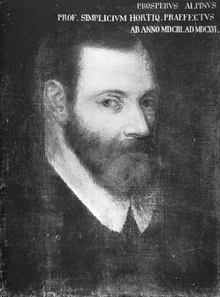Prospero Alpini
| Prospero Alpini | |
|---|---|
 Prospero Alpini (1553–1617) | |
| Born |
23 November 1553 Marostica, Republic of Venice (now Italy) |
| Died |
6 February 1617 (aged 63) Padua, Republic of Venice |
| Nationality | Italian |
| Fields | Botany, Medicine |
| Alma mater | Padua University |
Prospero Alpini (also known as Prosper Alpinus, Prospero Alpinio and Prosper Alpin) (23 November 1553 – 6 February 1617), was an Italian physician and botanist from the Republic of Venice.
Born at Marostica, a town near Vicenza, in his youth he served for a time in the Milanese army, but in 1574 he went to study medicine at Padua. After taking his doctor's degree in 1578, he settled as a physician in Campo San Pietro, a small town in the Paduan territory. But his tastes were botanical, and to extend his knowledge of exotic plants he travelled to Egypt in 1580 as physician to George Emo or Hemi, the Venetian consul in Cairo.[1]
In Egypt he spent three years, and from a practice in the management of Date Palms, which he observed in that country, he seems to have deduced the doctrine of the sexual difference of plants, which was adopted as the foundation of the Linnaean taxonomy system. He says that "the female date-trees or palms do not bear fruit unless the branches of the male and female plants are mixed together; or, as is generally done, unless the dust found in the male sheath or male flowers is sprinkled over the female flowers".[1]
On his return, he resided for some time at Genoa as physician to Andrea Doria, and in 1593 he was appointed professor of botany at Padua, where he died on 6 February 1617. He was succeeded in the botanical chair by his son Alpino Alpini (died 1637).[1]
His best-known work is De Plantis Aegypti liber (Venice, 1592).[1] This work introduced a number of plant species previously unknown to European botanists. The new species included[2] Abrus, Abelmoschus, Lablab, and Melochia, each of which are native to tropical areas and were cultivated with artificial irrigation in Egypt at the time. Another was Sesban meaning Sesbania sesban. Another was the baobab tree (which he spelled bahobab). Early adopters of Alpini's new botanical names included the botanists Carolus Clusius (died 1609), Johann Bauhin (died 1613), Caspar Bauhin (died 1624) and Johann Veslingius (visited Egypt in the 1620s; died 1649).[3]
Prospero Alpini's De Plantis Exoticis was published in 1629 after his death. It has an expansion of the material in De Plantis Aegypti plus some other material.
His De Medicina Egyptiorum (Venice, 1591) is said to contain the first account of the coffee plant published in Europe.[1]
The genus Alpinia, belonging to the order Zingiberaceae (ginger family), was named after him by Linnaeus.[1]
References
- 1 2 3 4 5 6
 One or more of the preceding sentences incorporates text from a publication now in the public domain: Chisholm, Hugh, ed. (1911). "Alpini, Prospero". Encyclopædia Britannica. 1 (11th ed.). Cambridge University Press. p. 737.
One or more of the preceding sentences incorporates text from a publication now in the public domain: Chisholm, Hugh, ed. (1911). "Alpini, Prospero". Encyclopædia Britannica. 1 (11th ed.). Cambridge University Press. p. 737. - ↑ Etymologisches Wörterbuch der botanischen Pflanzennamen, by Helmut Genaust, year 1996. See under each species name; book is alphabetically organized.
- ↑ E.g. Carolus Clusius year 1601 (in Latin), Prospero Alpini and Johann Veslingius year 1640 (in Latin), John Ray year 1686 quoting the Bauhin brothers (in Latin).
- ↑ IPNI. Alpino.
- Stannard, Jerry (1970). "Alpini, Prospero". Dictionary of Scientific Biography. 1. New York: Charles Scribner's Sons. pp. 124–125. ISBN 0-684-10114-9.
External links
- Prosperi Alpini De Balsamo dialogus . Franciscus de Franciscis, Venitiis 1591 Digital edition by the University and State Library Düsseldorf
- Prosperi Alpini De medicina Aegyptiorum : libri quatuor ; in quibus Multa cum de vario mittendi Sanguinis Usu per Venas, Arterias, Cucurbitulas, ac Scarificationes nostris inusitatas, deq[ue] Inustionibus, & alijs chyrurgicis Operationibus, tum de quamplurimis Medicamentis apud Aegyptios frequentioribus, elucescunt . Franciscus de Franciscis, Venetiis 1591 Digital edition by the University and State Library Düsseldorf
- Prosperi Alpini De Plantis Aegypti liber : in quo non pauci, qui circa Herbarum Materiam irrepserunt, Errores, deprehenduntur, quorum Causa hactenus multa Medicamenta ad Usum Medicinae admodum expetenda, plerisque Medicorum, non sine Artis Iactura, oculta, atque obsoleta iacuerunt. Franciscus de Franciscis, Venitiis 1592 Digital edition by the University and State Library Düsseldorf
- De Plantis Exoticis, by Prosperi Alpini, year 1629, in Latin.
- De Plantis Aegypti liber, by Prosperi Alpini with comments by Johann Vesling, published year 1640, in Latin.
- Online Galleries, History of Science Collections, University of Oklahoma Libraries High resolution images of works by and/or portraits of Prospero Alpini in .jpg and .tiff format. Includes some pages from the 1592 edition of De Plantis Aegypti liber.